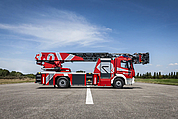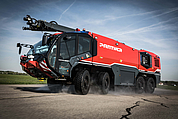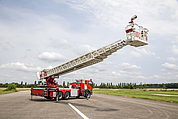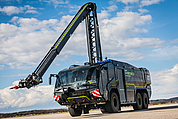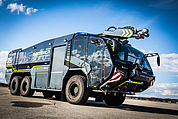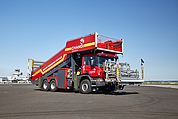At home in the airports of the world
- Success Stories
Rosenbauer International AG is an Austrian supplier of systems for firefighting headquartered in Leonding, Upper Austria. The company is one of the world’s leading manufacturers of firefighting vehicles and special firefighting equipment. As an outfitter of airport fire departments in just over 100 countries, Rosenbauer is known for the futuristic design of its special vehicles. Alongside the processing of certain hazardous goods transports by air freight, Rosenbauer most recently worked with cargo-partner on a tool for optimizing the time slot management at its warehouses and loading ramps. We made use of this opportunity to hold an interview with Julia Wintersteiger, Head of Logistics at Rosenbauer.
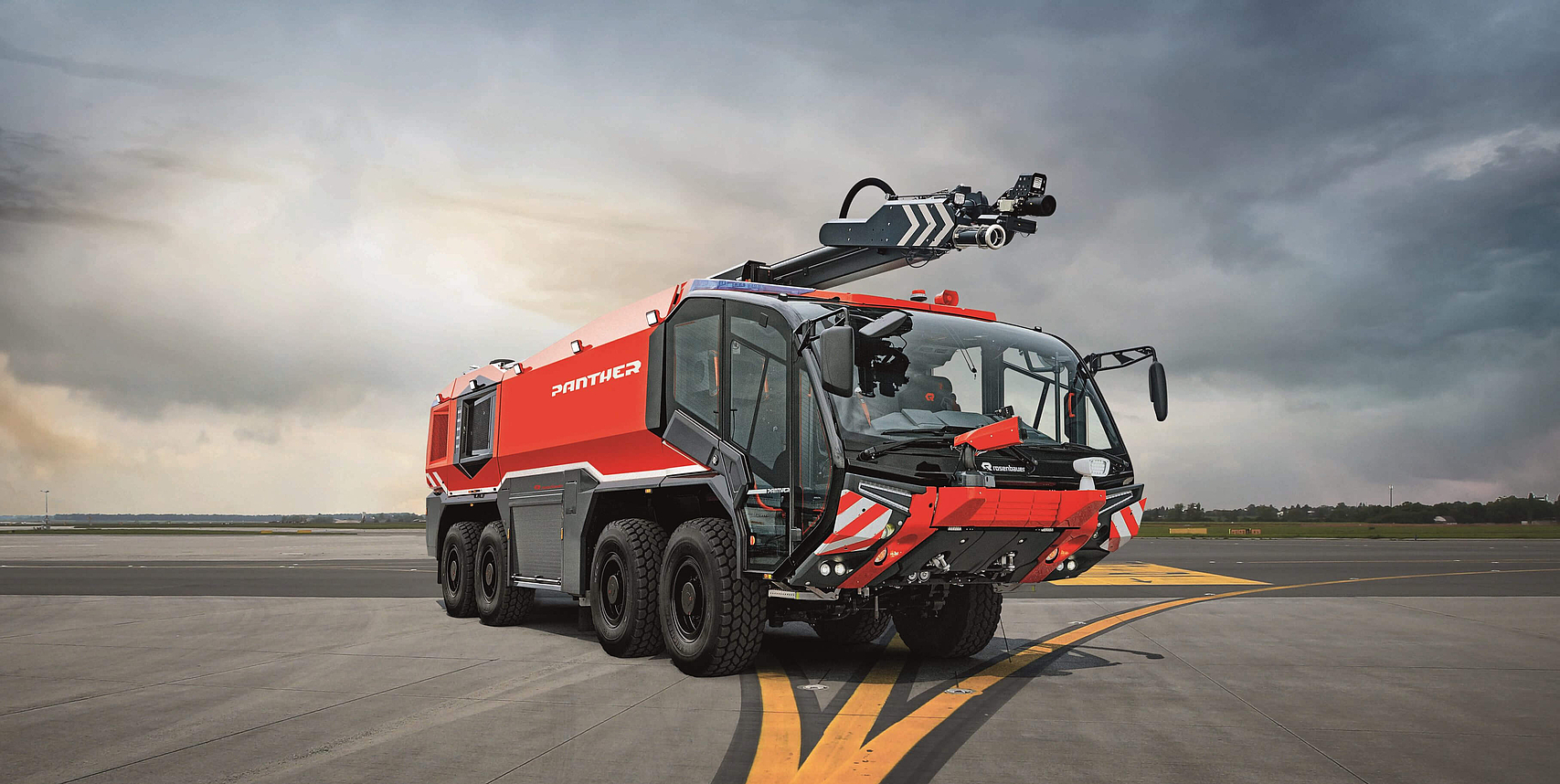
Futuristic design from a company with deep roots in the past
Sophisticated technology, high-performance machinery and vehicle designs heaped with awards. The products of Rosenbauer might give the impression of a young company, but in fact this specialist in firefighting equipment can look back on a long history. In 1866, Johann Rosenbauer founded his fire department supply company in Linz. His successor, Konrad Rosenbauer, took over the company in 1888, which marked the start of the in-house production of fire extinguishing equipment. After moving to a larger site, the company began producing its own hand-pumped extinguishers. From then on, there was constant pressure to continuously innovate and develop new product technologies. In 1908, the company began producing a pump driven by a gasoline engine. The first fire engine was manufactured in 1918. In 1926, the company exported its first vehicle to China. This success set the scene for the company’s future: of the Austrian production alone, over 90% is destined for export.
From the heart of Europe to the world at large
At its numerous production sites, Rosenbauer employed over 3,800 staff in 2019 and generated revenues of around 980 million euros, making it the largest supplier of firefighting equipment in the world. With a sales and service network in over 100 countries and a global customer base, Rosenbauer is heavily dependent on reliable transport logistics.
Alongside the processing of certain hazardous goods transports by air fright, Rosenbauer most recently worked with cargo-partner on an exciting software project. The cloud-based Supply Chain Visibility & Collaboration Platform developed by cargo-partner subsidiary SPOTworx simplifies the digitalization and automation of logistics business processes. Rosenbauer had particular need for the Time Slot Management module in order to reduce waiting times in the warehouse and smooth out the use of ramp capacities. We took this successful cooperation as an opportunity to speak with Julia Wintersteiger, Head of Logistics at Rosenbauer, about the future of the firefighting industry, electric fire trucks, the extremely successful Panther and the custom-developed tool.

"At cargo-partner, top-notch service is still an absolute priority. The work is handled smoothly and without hassle. Orders are processed quickly and reliably, including regular updates on progress."
Julia Wintersteiger, Head of Logistics at Rosenbauer, recalls the excellent collaboration between the two companies
Founded in 1866, Rosenbauer initially manufactured manually-operated fire extinguishing pumps. In 1908, the company developed its first gasoline-powered extinguishing system, and recently it has smoothly transitioned to the age of digitalization with its special firefighting vehicles. What can we expect from your field of business in the future – digital screens in the driver’s cab and water canon control via a special camera and joysticks?
Julia Wintersteiger: The “Concept Fire Truck” from Rosenbauer, called CFT for short, is a perfect example of the technologies of the future. The CFT was first presented to the public in 2016, and the fire departments of large cities such as Amsterdam, Berlin and Los Angeles have already ordered pre-series vehicles based on the CFT and will be putting them through extensive testing. As the fire engine of the future, the CFT anticipates major megatrends such as climate warming, demographic changes and urbanization as well as the associated challenges for fire departments. Thanks to the use of electric drive technology, the vehicle architecture is entirely new and fully adapted to the expected future scenarios, allowing the CFT to set new standards in both functionality and ergonomics.
The Rosenbauer Group is a leader in its field, with an outstanding global reputation. And cargo-partner is known as a medium-sized logistics enterprise with global coverage. How does collaboration with cargo-partner differ from the “big players” in the transport industry?
At cargo-partner, top-notch service is still an absolute priority. The work is handled smoothly and without hassle. Orders are processed quickly and reliably, including regular updates on progress. All in all, cargo-partner succeeds in finding the right balance between price and performance.
In addition to handling certain hazardous goods transports by air freight, you are also using the newly developed time slot management tool from SPOTworx. What motivated you to make this choice, and how has that software worked out so far?
We held the kick-off workshop for the project “Time Slot Management at Rosenbauer” in January 2019. Creation of the requirements specification was followed by the programming phase with step-by-step coordination between Rosenbauer and SPOTworx. After a number of constructive workshops, we had the first chance to try out the application, which was then gradually refined and finalized. During this time, a detailed survey of the incoming goods processes was initiated. Key data for customizing the tool as precisely as possible was also obtained in a time class analysis and a material flow analysis. In September 2019, an external carrier was selected as a pilot for carrying out daily deliveries at the same time every day. This made it possible to determine the actual time that corresponded to the time entered in the time slot management tool.
The tool is very easy to use and has been effectively customized to Rosenbauer’s needs. Another advantage is that we are able to fully integrate additional locations and external warehouses with minimal effort. Reports detailing key figures, an address book and the tracking function are just a few of the other useful features offered by the tool.
Our experiences in the pilot phase have shown that the time is entered correctly by the dispatchers of the partner carrier without deviating by more than about 10 minutes. The correct information on the packages (number of items, type of shipment, such as XL pallets, EUR pallets, etc.) is also checked by RBI logistics, and the deviations are discussed and coordinated with the carrier at regular intervals.
In the next step, we are now working on rolling out the solution for other carriers, which will be successively integrated into the system. A manual and a concise user guide have already been created to assist the external partners. The go-live with all carriers should take place in summer of 2020, as soon as training and further coordination is completed.
As an expert in air freight, cargo-partner is at home in the world’s airports. Meanwhile, Rosenbauer is known for outfitting numerous airport fire departments. In all honesty, do you know how many airports around the world use equipment from Rosenbauer?
In January 2020, the two-thousandth “PANTHER” was delivered. This Rosenbauer premium vehicle is one of the most successful airport fire engines in the world and is used in about 100 different countries. But the “PANTHER” isn’t the only one of our products to be found in use at airports. Rosenbauer also supplies airport fire departments around the world with escape stairs and command vehicles as well as personal protective equipment for firefighters.
Thank you for the interview
cargo-partner has been working with the cloud-based supply chain management platform SPOT since the year 2000, making use of the platform's ever-growing range of features to streamline its collaboration with customers and partners along the whole supply chain. Following the launch of SPOT’s Parcel module in 2018, the platform has now once again received a new addition as of September 2019. The Time Slot Management module supports carriers and warehouse operators in scheduling time slots for loading and unloading activities at warehouse locations.
With SPOT Time Slot Management, cargo-partner’s road carriers can book their loading and unloading time windows themselves or receive a period from the warehouse during which they can select their preferred time window on the respective ramp. It is also possible for a warehouse to allocate a specific time window. The available loading times are calculated and determined on the basis of the actual load of the truck. The allocated loading ramp depends on the load as well (e.g. oversized goods unloaded only at specific docks). Thanks to precise information about pickup and delivery time slots, ramp utilization can be enhanced, leading to higher efficiency in warehouse operations. This process leads to faster processing and therefore reduced costs and a higher service level.
About SPOT
SPOT was launched in 2000 and has received numerous add-ons and improvements since then. Accessible from any web browser or as a mobile app, SPOT started as a simple tracking tool and has since grown into a comprehensive transport management system, with modules ranging from Purchase Order and Transport Management to Warehousing, Reporting and Parcel. The Time Slot Management module, launched in September 2019, is the newest addition.

St. Patrick’s Day: Ireland’s green hit export
- Insights
When the commemoration of an Irish bishop prompts people all around the world to paint their faces green and drink a lot of beer, it’s St. Patrick’s Day again. Sláinte!
More information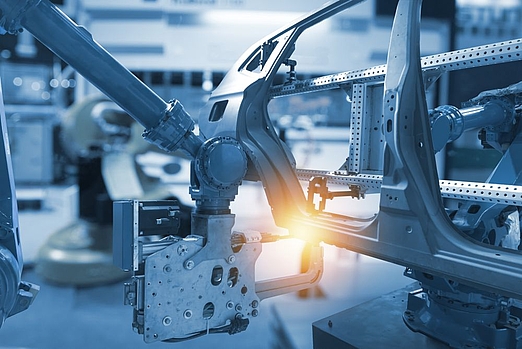
Comprehensive logistics for 88,000 vehicles per year
- Success Stories
Minth is a leading automotive supplier with growing global significance and cargo-partner provides the vehicle parts manufacturer with a comprehensive and accurate logistics solution.
More information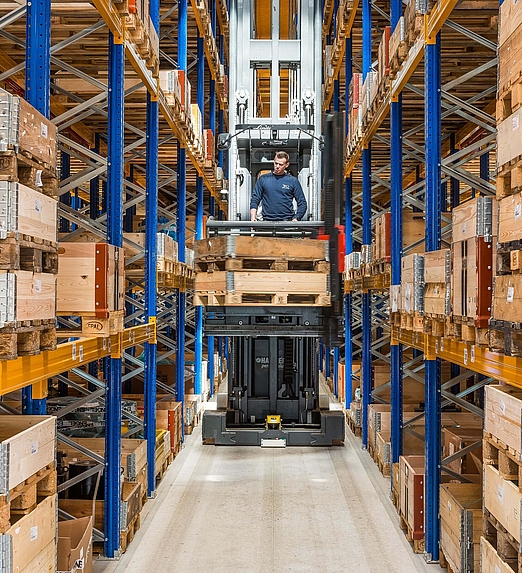
Good neighbors: Makita and cargo-partner celebrate 10 years of cooperation
- Success Stories
It started with air and seafreight shipments in 2009. The cooperation continuously grew closer, and in 2018, the two companies cemented their partnership by moving in next to each other.
More information
A vehicle named Vera
- Insights
Volvo Trucks has developed the first autonomous tractor unit for heavy haulage and called it Vera – a low-profile, noiseless vehicle with no driver’s cab.
More information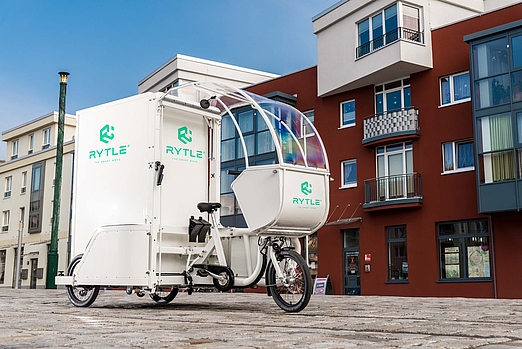
Rolling change on that last mile
- Insights
Revolutionizing delivery logistics in urban areas – that is the vision behind the electric cargo bike created by Rytle. Particularly impressive: it can handle entire palettes, and even…
More information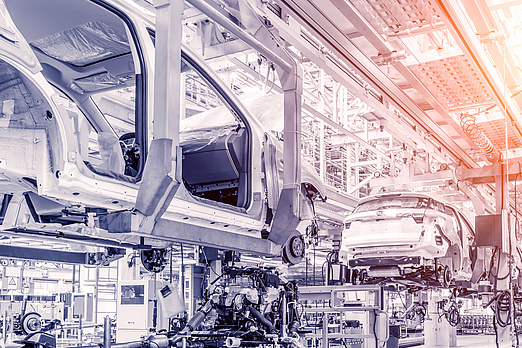
How the automotive industry will transform
- Insights
With several rapidly developing digital technologies and profound research in the field of acceleration, mobility behavior will change constantly. Are you ready for this?
More information
